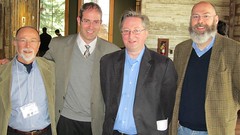
/
RSS Feed
William McNeill, Professor of Philosophy at DePaul University, commented on my book, Aristotle on the Nature of Truth, at the 2011 meeting of the Ancient Philosophy Society.
Will’s comments offer a very good introduction to the scope, methodology and significance of the book. His kind words are greatly appreciated as are the important questions he raises.
He begins with a very thoughtful and thorough account of the main themes of the book, including my attempt to understand truth in terms of justice and my development of a new understanding of ecology and ecological community. He then goes on to explicate the meaning of “legomenology,” which designates the method I argue Aristotle follows. This approach recognizes that the nature of things is revealed in part in and through the things said about them, that our attempts at articulating the truth of things lends insight into something of the nature of things: ta legomena, the things said, are able to reveal something of the truth of ta phainomena, the things appearing.
Will also challenges me to consider more fully the degree to which I privilege a sort of homecoming over “a certain homelessness” and he points me to Heidegger’s interpretation of dynamis in the 1931 lecture “On the Essence and Actuality of Force” on Metaphysics Theta, where Heidegger focuses on negativity, withdrawal and inner finitude as a place where a different vision of Aristotle is developed. He invites me to address more deeply the implications of modern technicity and globalization on what I have called the “ecological community.” This, indeed, is an important dimension of the book that remains an open area of research, one that I hope to address as I think more deeply about the original Greek understanding of techne with the help, no doubt, of by Will and Heidegger.
I invite you to listen to Will’s paper here and to respond to the things he says:
To hear the other comments and my responses, click on the links below:
Here are images from the APS Book Panel:


he certainly raises the proper concerns from a conservative Heideggerian (perhaps even Derridean) standpoint but I think that one has to understand/engage these matters from a naturalized/demythologized/Darwinian perspective like the one gestured towards by Rorty in his Mirror book (certainly not the last word along these lines) and other thinkers after Canguilhem like Rabinow, Pickering, and the enactivists.